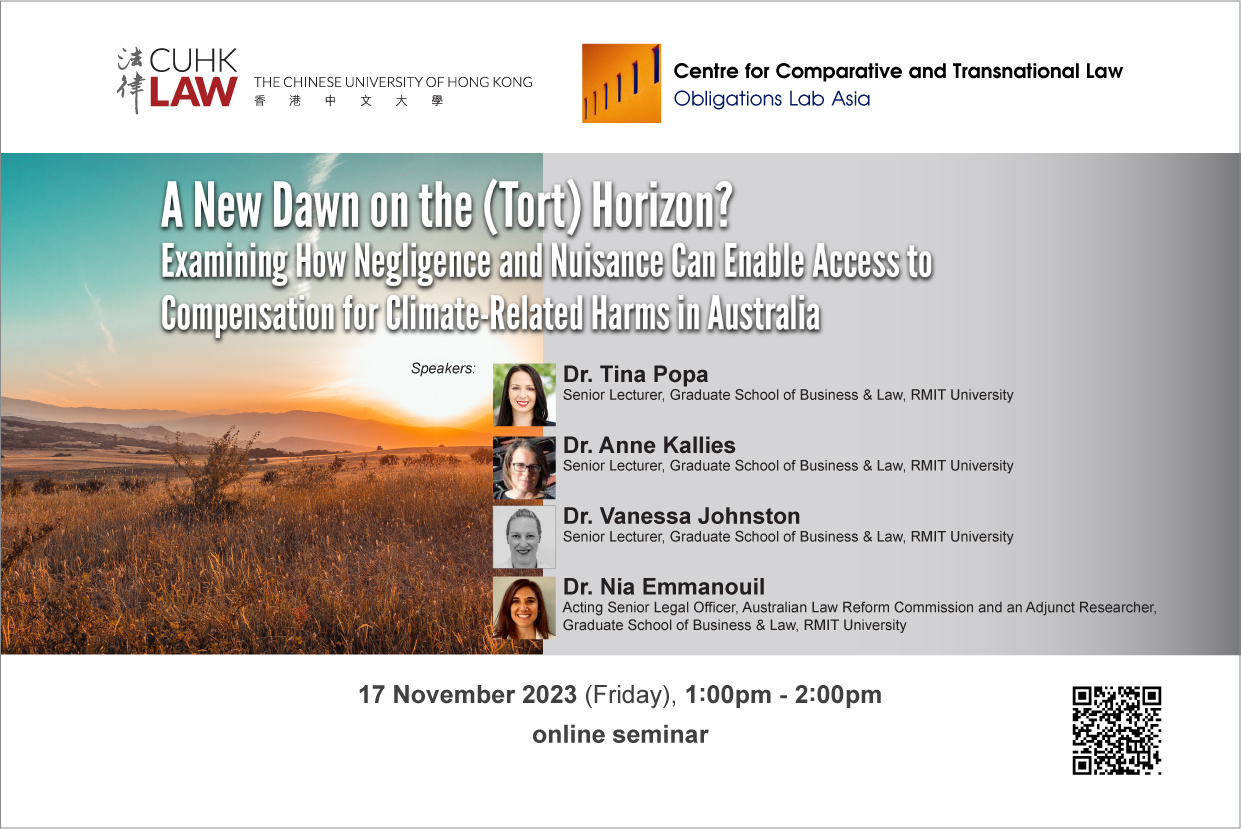活动
CUHK LAW CCTL Obligations Lab Asia Seminar – ‘A New Dawn on the (Tort) Horizon? Examining How Negligence and Nuisance Can Enable Access to Compensation for Climate-Related Harms in Australia’ (Online)
2023年11月17日
1:00 pm – 2:00 pm
Online (Zoom)
Dr. Tina Popa is a Senior Lecturer at the Graduate School of Business & Law, RMIT University. Tina’s research and teaching interests are in tort law, health law, psychiatric harm and appropriate dispute resolution. She is the co-author of Contemporary Australian Tort Law (Cambridge University Press, 2020) and the General Editor of the Tort Law Review (Thomson Reuters). More recently, she has published on contemporary issues relating to tort law liability for the adverse effects of climate change.
Dr. Anne Kallies is a Senior Lecturer at the Graduate School of Business & Law, RMIT University, researching in the areas of energy, environment and climate. The emphasis of Dr Kallies’ research is on energy and environmental law, which a special focus on renewable energy and electricity market regulation. Her research draws on her study and work experience in Australia and Germany. She holds a German law degree, as well as a LLM and a PhD, both completed at Melbourne Law School. Dr Kallies has previously worked for the German Federal Environmental Agency and has been an administrator and researcher in the Centre for Resources, Energy and Environmental Law at Melbourne Law School.
Dr. Vanessa Johnston is a Senior Lecturer at the Graduate School of Business & Law, RMIT University, researching in the areas of climate change and environmental law as it relates to planning and land use, property rights and sustainable transport. She has worked on industry projects pertaining to sustainable transport and has published research about on the liability of cyclists and pedestrians in tort law. Dr Johnston has written on climate change and is increasingly researching the intersect between the adverse effects of climate change and tort law.
Dr. Nia Emmanouil is Acting Senior Legal Officer at the Australian Law Reform Commission and an Adjunct Researcher at the Graduate School of Business & Law, RMIT University. She is a highly skilled legal researcher, who has dedicated her 20-year career to the flourishing of minority communities and the natural environment. She recently published on climate change litigation in private nuisance.
Increasingly, the global community is recognising that climate change can cause and contribute to a range of harms and hazards that impact the personal safety and property of vulnerable communities. A plethora of scientific reports have highlighted the need for governments and corporate actors to reduce greenhouse gas emissions to minimise the adverse effects of climate change, and to protect infrastructure and assets from climate change-related damage. In some instances, however, actions that are taken are too little, or too late, to address the existing risk of harm.
Recent case law in Australia and internationally, has highlighted that individuals and communities affected by climate change may be able to use tort law to initiate actions against public and private entities in relation to their actions (or omissions). Tort law, while often seen as being rooted in rigid doctrine, has already been used as a vehicle to ‘test’ potential civil cases about climate change-related harm.
The torts of negligence and private nuisance show great potential as means to claim compensation for change-related harms. While the application of negligence to climate change-related harm has already been tested in the Full Federal Court of Australia’s highly publicised 2022 decision of Sharma and Others v Minister for the Environment, the Court held that the Australian government did not owe a duty of care to the applicant on the facts at hand. While untested to date, the tort of private nuisance could provide an alternative avenue for landowners that have suffered harm or interference to their rights.
The law of torts has remarkable potential to adapt to societal needs to respond to climate change risk. This presentation considers how causes of action in tort law, specifically negligence and nuisance, can assist litigants pursuing a claim for compensation for climate change-related harms. The presenters analyse barriers to success, including existing doctrine and policy considerations, to argue that tort law has remarkable flexibility to adapt to the needs of people affected by climate change. However, the full potential for tort law has not yet been tested in Australia and its effects remain to be seen.
Language: English


